Hey there, fellow apartment dwelling dog lovers! If you are anything like me, your furry best friend brings endless joy to your cozy city pad but letis be real, dealing with their “business” is not always glamorous. Especially when you are staring down a tiny balcony or a shared dumpster that feels a world away from a backyard.
As someone who is passionate about eco-friendly dog care, I have spent the last couple of years experimenting with sustainable ways to handle dog waste without adding to the landfill pile up. And in 2025, with more urban pet owners embracing sustainable pet ownership, it is easier than ever to make a difference.
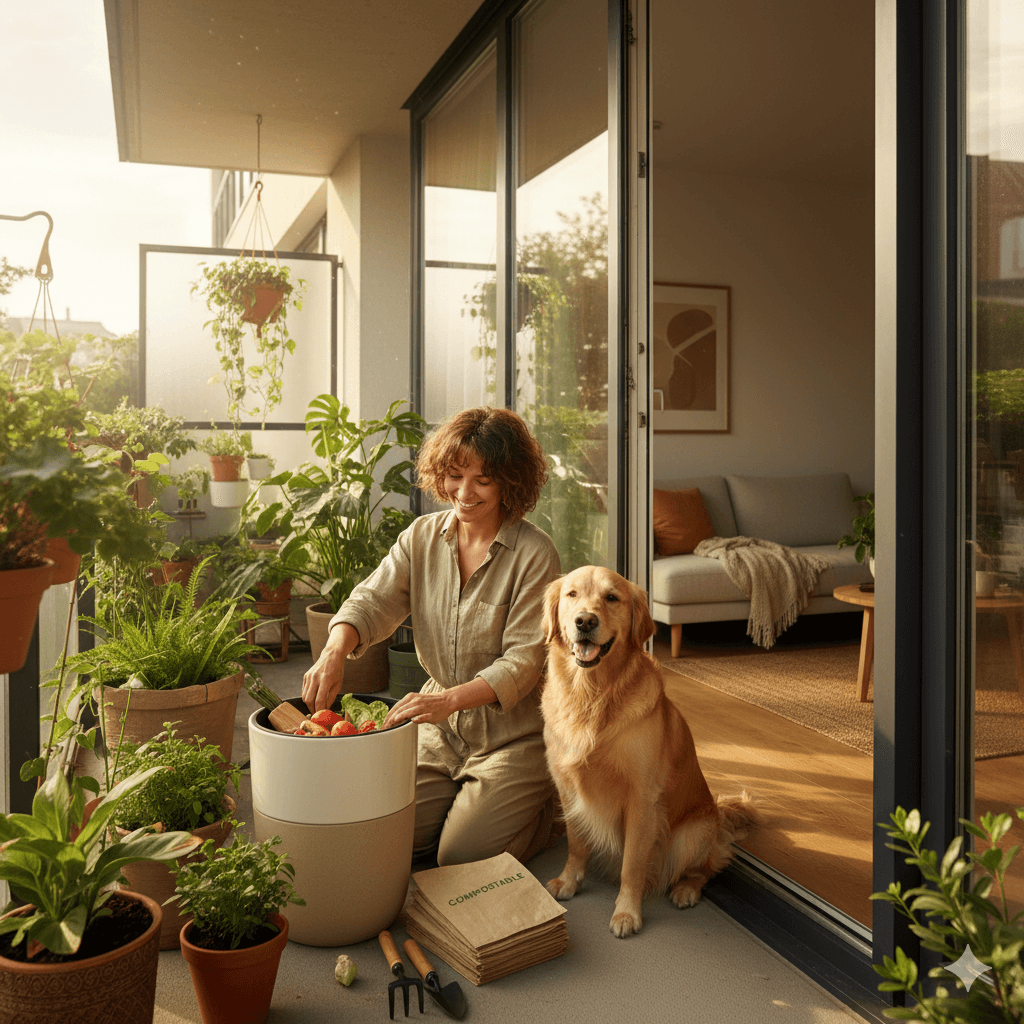
This guide is your go to for how to decompose dog waste in an apartment, think practical, space saving tips that turn poop into something less problematic for the planet. We will dive into why it matters, the legal nitty gritty, step by step methods for composting dog poop indoors, must have tools, pitfalls to dodge, and even ways to connect with like minded folks.
By the end, you will feel empowered to level up your eco-friendly game while keeping your space odor free and neighbor friendly.
Table of Contents
The Environmental Impact of Dog Waste
Lets Just be honest with ourselves that your dog’s daily waste is nnt just a quick scoop and toss situation but it is a sneaky contributor to some serious environmental drama.
In the U.S. alone, dogs produce over 10 million tons of waste annually, and when it ends up in landfills or washes into storm drains, it spells trouble. That dog poop is loaded with nitrogen and phosphorus, which fuel algal blooms in waterways, choking out oxygen and killing fish.
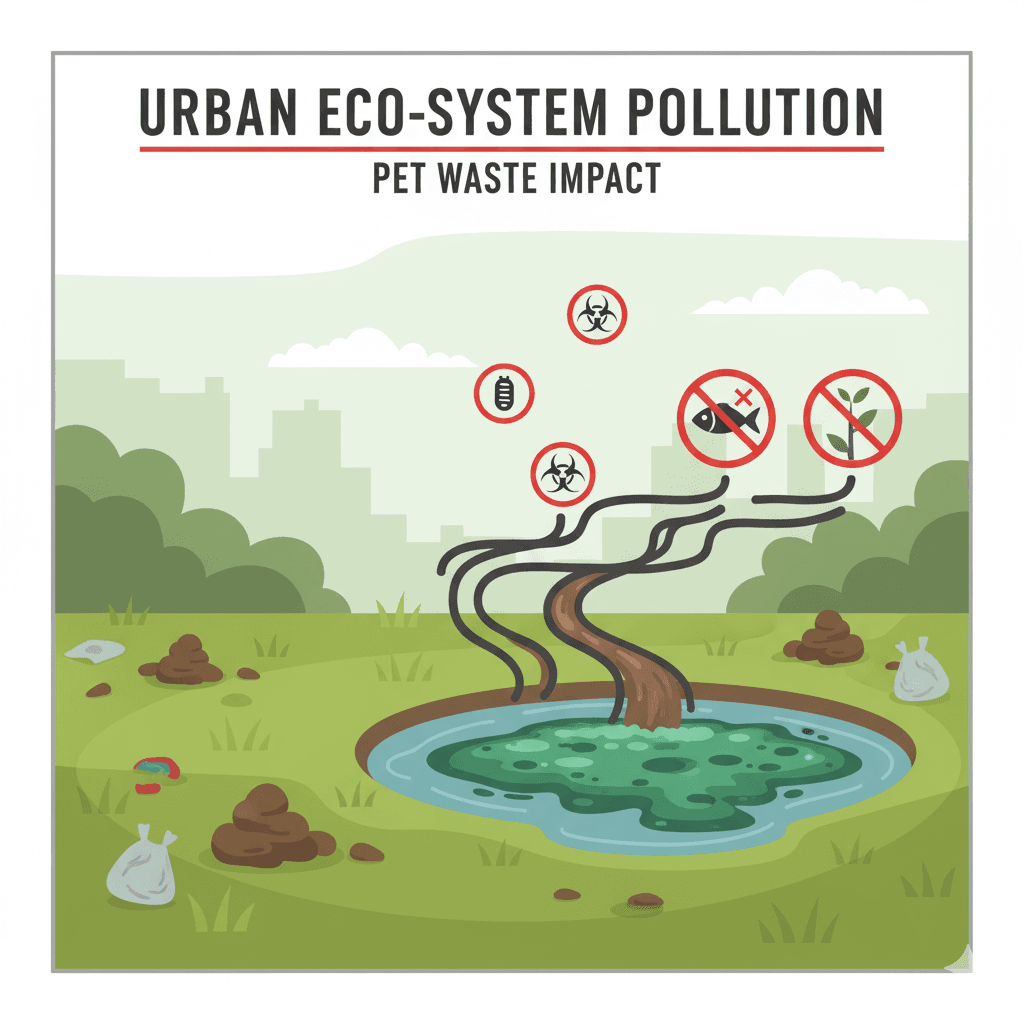
One gram of dog waste can harbor up to 23 million bacteria, including nasty pathogens like E. coli and parasites that threaten wildlife and even our drinking water. This data has been sourced by livescience.com.
Why It Matters More Than You Think
A 2025 New York Times piece highlighted how pet waste is quietly exacerbating soil contamination and water pollution in urban areas, where green space is scarce. It is not all doom, though shifting to decomposition methods can cut methane emissions from landfills by up to 50%, according to recent EPA updates. For apartment dwellers, this means small actions like composting can ripple out to cleaner rivers and healthier parks.

These real talk exchanges remind us that eco-friendly dog care is not just trendy it’s urgent for sustainable pet ownership.
Dog owners on Reddit are all over this conversation. In a sustainability subreddit thread, users break down how traditional plastic poop bags are basically microplastic bombs waiting to explode in our oceans, with one commenter noting, “Dog waste’s nutrients sound great until you realize the bacteria and parasites it carries composting right is key.” Another r/dogs discussion dives into why leaving it on trails is a no-go: “It washes into waterways as a major pollutant, spiking nitrogen levels.”
Considerations for Apartment Dwellers
There are basically two main considrations for the dog owners who live an appartemnt or who rent an appartment.
Legal Considerations
Before you start your indoor composting adventure, let’s chat rules and risks. As per dogster.com Legally, most U.S. cities require pet owners to pick up dog waste immediately to prevent public health hazards and fines can hit $100 or more in places like Seattle or New York.
But composting? That’s where it gets tricky. Many municipalities, like those in Washington state, ban pet waste in residential compost bins because home setups don not hit the 140°F temps needed to kill pathogens (per WAC 246-203-130 guidelines). Flushing small amounts is often okay if your local sewer system allows it, but check your lease and apartment complexes might enforce strict trash-only policies to avoid odors or pest issues.
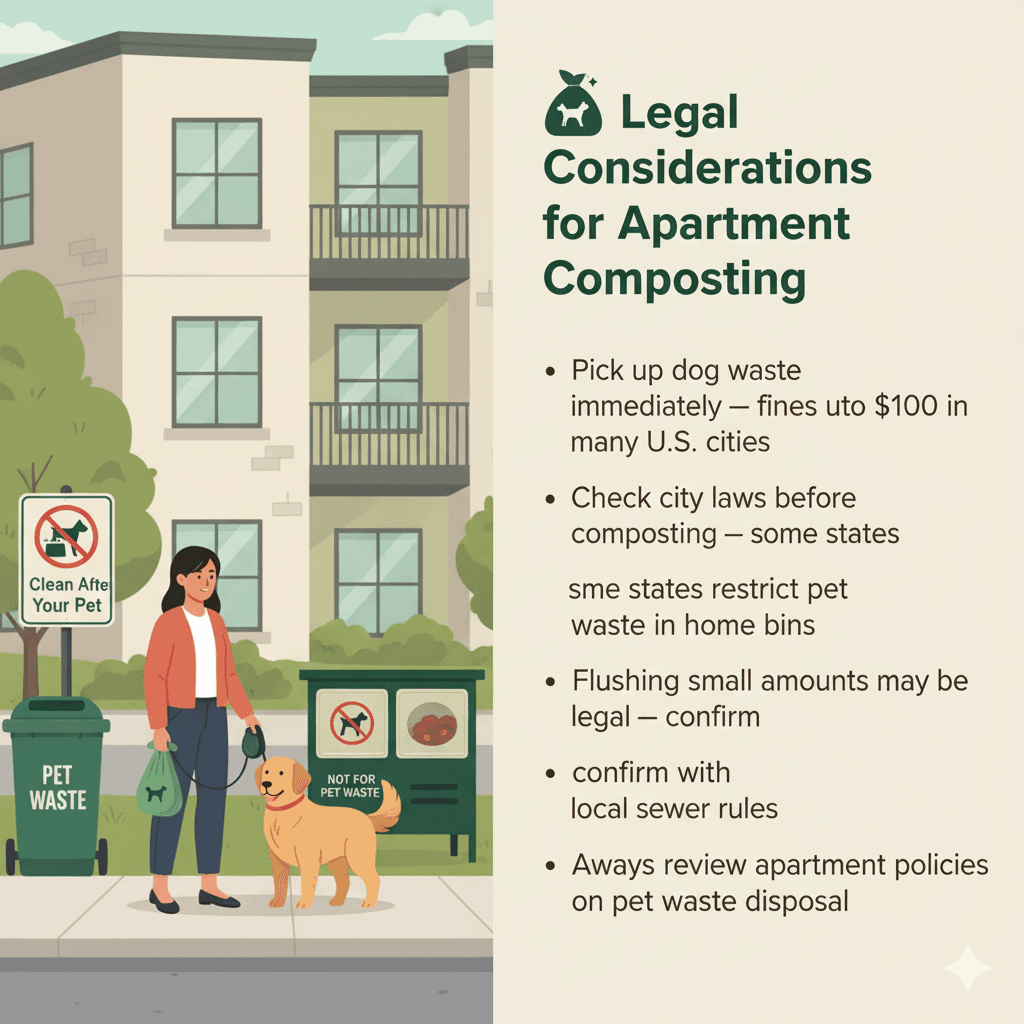
Health Considerations
Health wise, dog poop can carry roundworms, hookworms, and salmonella, posing risks to kids, immunocompromised folks, or even other pets if not handled right. The CDC flags it as a vector for zoonotic diseases, especially in shared spaces like apartment courtyards. Bothell, WA’s public health site warns: “Residential compost piles don’t get hot enough to neutralize those harmful organisms,” so improper decomposition could backfire.
A Reddit legal advice post from apartment renters echoes this: One user vented about lax enforcement in their complex, sparking tips like “Talk to management about designated waste stations to stay compliant.”
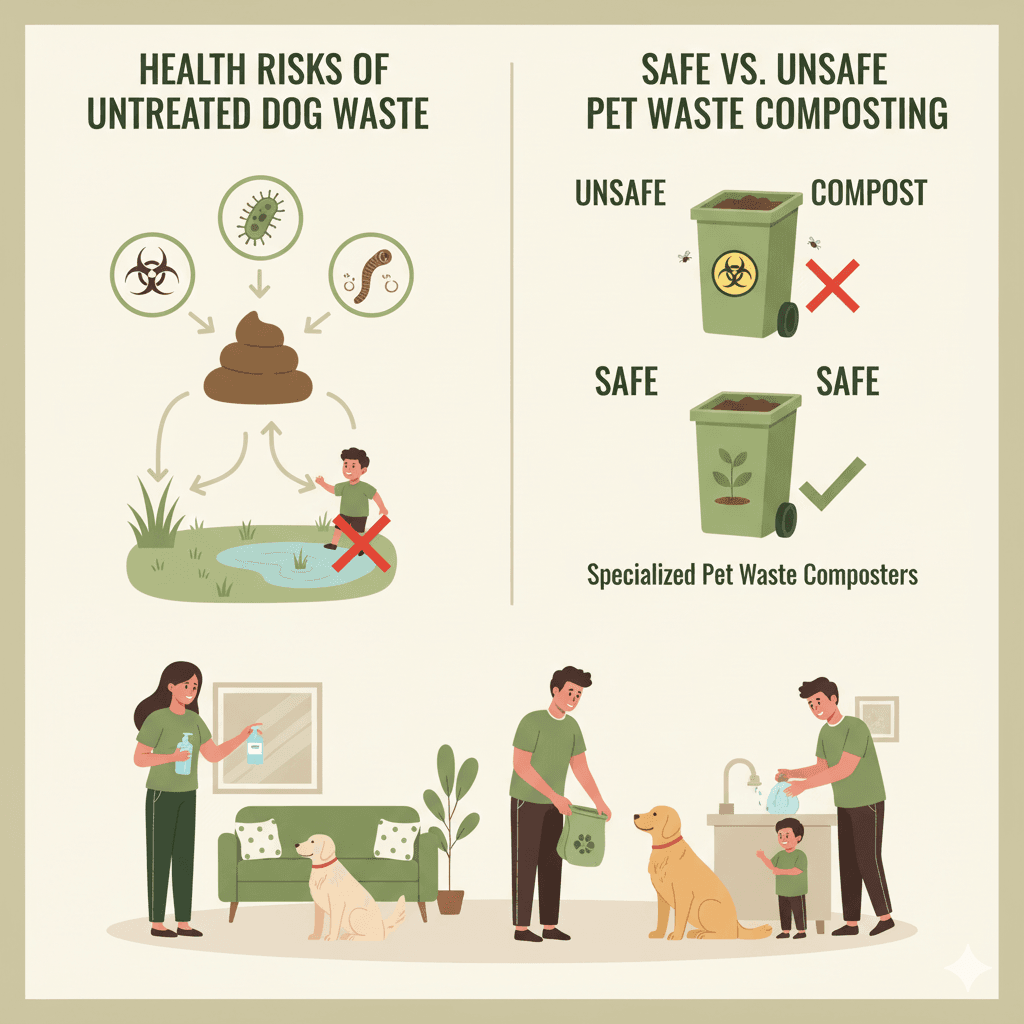
Bottom line? Prioritize sealed, ventilated systems to keep things safe and legal and your neighbors (and landlord) will thank you.
Step-by-Step Guide to Composting Dog Poop Indoors
Ready to roll up your sleeves? Composting dog poop indoors is totally doable in small spaces, focusing on low-odor, pathogen killing methods like bokashi fermentation or enzyme digesters. These beat traditional hot composting, which needs yard real estate you probably don’t have. Here’s a straightforward 2025 update to how to decompose dog waste in an apartment, tailored for your galley kitchen or balcony nook.
Step 1: Gather Your Gear
Start with a sealable bokashi bin (about $30 on Amazon) or a countertop digester like the EnviroWagg. Line it with newspaper or sawdust for absorbency. Add a bokashi bran inoculant and it’s packed with microbes that ferment waste anaerobically, no heat required.
Step 2: Prep the Poop
Scoop fresh waste into biodegradable bags (more on those later) to contain mess. Chop it up if it’s from a big dog to speed breakdown and think bite sized for bacteria’s sake.
Step 3: Layer and Ferment
Sprinkle a handful of bokashi bran over each addition, then press down to remove air pockets. Seal the bin and store it in a cool, dark spot like under your sink. Ferment for 2-4 weeks; it will smell like pickles, not poop, thanks to the lactic acid bacteria.
Step 4: Bury or Finish
Once fermented (it will look like dark soil), bury it 8-12 inches deep in a community garden plot or mix with yard waste for off site composting. If burial is not an option, dilute the liquid byproduct (bokashi tea) with water and use it as a drain cleaner and never on edibles.

TikTok creators are nailing this for visual learners. @milkwood’s quick guide on composting pet poo shows a simple bucket setup turning waste into fertilizer in under a minute of demo time. And the #HowToCompostPetWaste trend has exploded this year, with over 23 million views on hacks like apartment friendly vermicomposting (using worms in a Rubbermaid bin).
Pro tip
- Start small with one week’s worth to test odors.
- Expect full decomposition in 6-12 months, yielding nutrient rich humus safe for non-food plants. It is a game changer for composting dog poop indoors without the hassle.
Alternatives and Tool
Eco-Friendly Alternatives
If full on composting feels daunting, no sweat 2025’s got a toolkit of sustainable swaps that fit apartment life. Biodegradable poop bags made from corn starch or mushroom mycelium break down in 3-6 months, versus plastic’s 100+ years. Brands like GreenPoo or Begley’s Earth get rave reviews for strength without the guilt.
Eco-Friendly Tools for Small Spaces
For decomposition pros, pet waste digesters are compact MVPs. The Doggie Dooley Septic-Style System ($40) installs in a 5 gallon bucket on your balcony, using enzyme powders to liquify waste weekly and just add water and stir. It is odorless and handles up to two small dogs. For indoor vibes, the PetSafe In Ground Digester uses beneficial bacteria to process waste in a buried container, perfect if you have a tiny patio.
Instagram is buzzing with these gems. @g.k.p.’s reel on next gen pet waste bags showcases California designed, plant based options that “compost like a dream.” And @positivelygreenliving shares DIY digester builds using recycled buckets, tying into broader eco-friendly dog care trends.
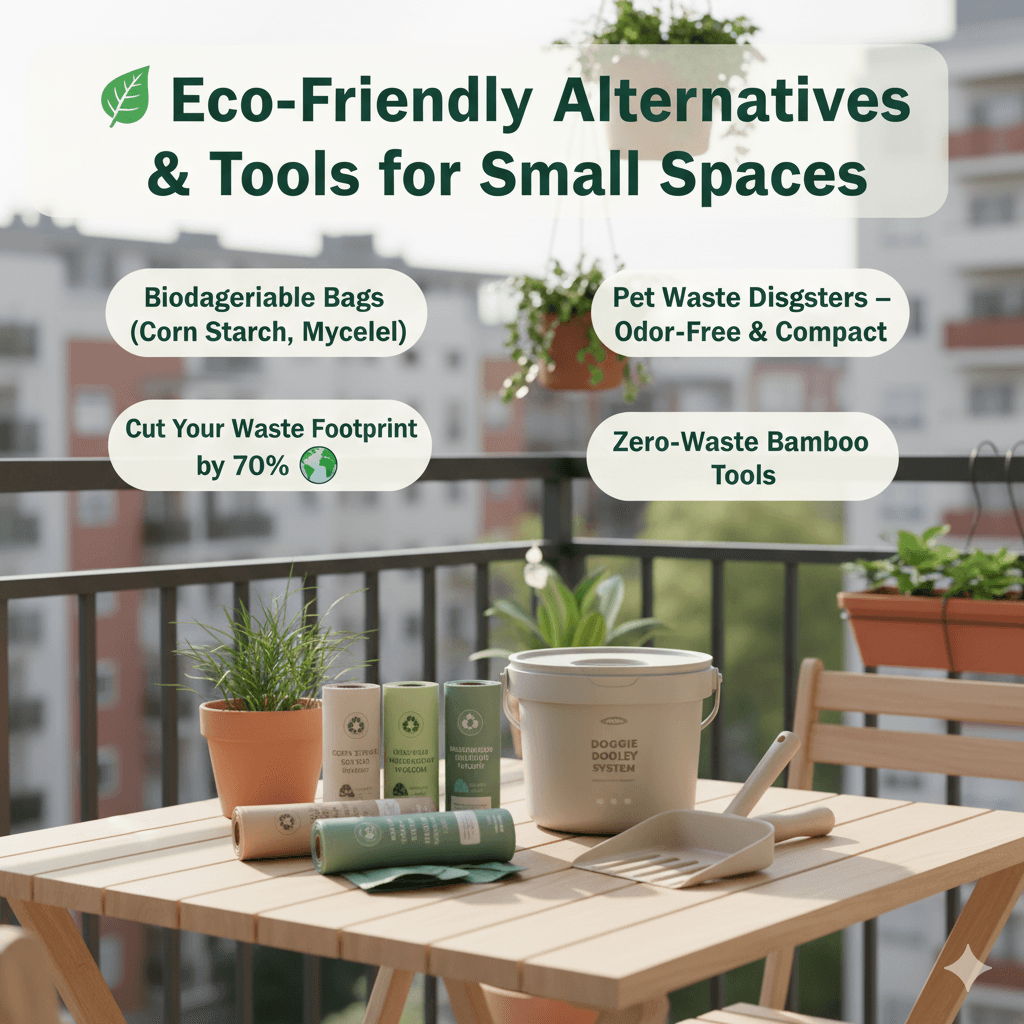
Pair these with a long handled pooper scooper from bamboo for zero-waste walks. These tools make sustainable pet ownership accessible, cutting your waste footprint by 70% per recent Earth Day reports.
Common Mistakes and How to Avoid Them
Even eco-warriors slip up and here’s how to sidestep the stinkers in your decomposition journey.
Mistake 01: Skipping pathogen checks
People dicuus this issue on reddit that Skipping pathogen checks. Dog waste from meat-eaters needs extra microbes; fix it by always using inoculated starters like bokashi bran to hit that safe breakdown.
Mistake 02: Overloading your bin
This is very common mistake that most of time even do not notice like apartment setups max out quick—add no more than a cup daily to prevent anaerobic rot smells. Stir weekly and vent to keep air flowing.
Mistake 03: Ignoring moisture balance
Too wet? Mold city. Layer with dry carbon (shredded paper) for 2:1 ratio. YouTube’s got your back: The Epic Gardening channel’s “7 Deadly Sins of Composting” video calls out wet piles as the top offender, with fixes like pine shavings for pet-specific tweaks. Another gem, “Can You Compost Dog Droppings?” from Survival Gardener Minute, warns against using finished compost on veggies and stick to ornamentals.
Mistake 04: Forgetting the flush fallback
If composting flops, flush solids (sans bag) to sewers designed for it. A quick r/composting Reddit search reveals users regretting “hot” attempts in tiny spaces: “Went anaerobic and smelled like death and switched to enzymes.” Learn from them: Monitor weekly, and scale back if needed.
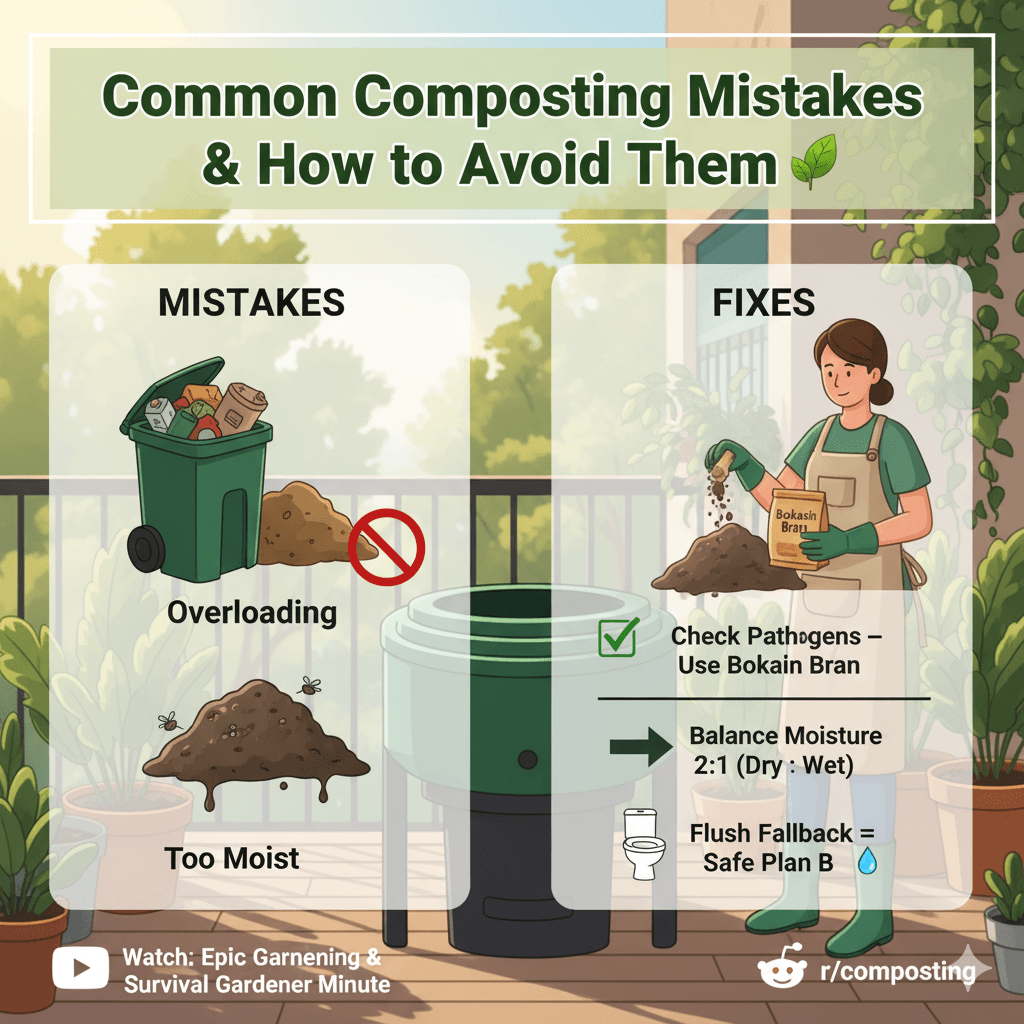
Eco-Friendly Dog Waste Management
Joining the Community
You are not alone in this and communities are popping up to champion green poop practices. Facebook’s Enviro Pet Waste Network connects 169+ members pushing to divert waste from landfills, sharing tips like “plastic free bag swap” and local digester installs. Their posts spotlight successes, like Charleston’s county wide composting drive tackling 20,000 tons of annual dog waste.
In San Francisco, a 2016 launched (but thriving in 2025) dog waste composting program at Starr King Open Space uses special bins to turn poop into park mulch and join via their FB group for volunteer gigs. TikTok’s #SustainablePetWaste trend features collabs with brands offering free enzyme kits, while Reddit’s r/sustainability hosts AMAs with urban composters.
These hubs foster sustainable pet ownership through challenges like “Poop Free July,” where members track decomposition wins. Dive in and it’s motivating to see apartment vets turning waste into community wins.
Conclusion
There you have it, a full blueprint for how to decompose dog waste in an apartment that honors the planet without overwhelming your lifestyle. From grasping the pollution punch to mastering indoor composting and linking up with eco-tribes, these steps make sustainable pet ownership feel achievable and even fun. Start with one change, like swapping to bio-bags, and build from there. Your dog (and the waterways) will wag their tails in thanks.
What’s your first move? Drop a comment below. I would love to hear your hacks. For more zero-waste dog tips, stick around at Zero Waste Paws. Let’s keep those paws light on the earth!
